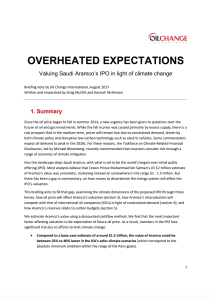 Download the briefing – Overheated Expectations: Valuing Saudi Aramco’s IPO in light of climate change
Download the briefing – Overheated Expectations: Valuing Saudi Aramco’s IPO in light of climate change
Written and researched by Greg Muttitt and Hannah McKinnon.
See Financial Times article on our report.
Coming two years after the Paris Agreement, the initial public offering (IPO) of Saudi Aramco will be strongly shaped by climate change. Most analysts believe that Crown Prince Muhammad bin Salman’s US $2 trillion estimate of Aramco’s value was unrealistic, reckoning instead on somewhere in the range $1 to 1.5 trillion. But there has been a gap in commentary, on how moves to decarbonise the energy system will affect the IPO’s valuation.
Oil Change International’s new briefing aims to fill that gap, examining the climate dimensions of the proposed IPO through three lenses: How oil price will affect Aramco’s valuation (Section 3), how Aramco’s oil production will compete with that of international oil companies (IOCs) in light of constrained demand (Section 4), and how Aramco’s reserves relate to carbon budgets (Section 5).
We find that:
- Compared to a base-case estimate of around $1.5 trillion, the value of Aramco could be between 25% to 40% lower in the IEA’s safer-climate scenarios (which correspond to the absolute minimum ambition within the range of the Paris goals); and
- If oil prices stay at $50 in real terms, Aramco’s value could be reduced to less than $700 billion, 55% below the base case.
The IPO is thus a real test of whether investors are thinking seriously about climate change. A high valuation, say above $1 trillion, would indicate they are betting on a failure to address climate change, through an expectation of high future oil demand. Investments in the IPO could then be at significant risk.
The question of whether Aramco is advantaged relative to international oil companies (IOCs) because of its low production cost depends on the shape and timing of climate policy. If governments continue to drag their feet on reducing emissions, IOC production will remain viable for longer, and assuming governments ultimately act to keep warming below 2ºC, a large proportion of Aramco’s reserves may be left unburned. However, this scenario would also entail rapid emissions cuts later, forcing down prices within investment timescales of 15 to 25 years, and causing significant destruction of oil company assets. As such, it creates the greatest financial risk to all.
We conclude:
- If the IPO realises a value at the higher end of the likely range (say, above $1 trillion), its investors could face significant risk from climate policy; and
- If it comes out lower, this may raise questions of whether IOCs are overvalued.
If fully extracted and burned, Saudi reserves would have a profound impact on the climate. Emissions from Saudi reserves would amount to 112 Gt of carbon dioxide, one seventh of total global emissions in a 2ºC carbon budget, or one third of total global emissions in a 1.5°C carbon budget. The problem is not so much Aramco on its own, but Aramco in combination with IOCs, which constantly explore for and open up new reserves to replace what they have extracted.
- Emissions from the oil, gas, and coal in the world’s already-producing fields and mines are enough to take warming beyond 2°C.
- Aramco’s reserves may only be fully extracted if IOCs immediately stop exploring for and developing new reserves. The different production strategies of Saudi Aramco and of IOCs are together not compatible with achieving the Paris Agreement’s goal of keeping global warming well below 2ºC and aiming for 1.5ºC.
- If IOCs continue to add new oil and gas, Aramco’s reserves stand to push the world beyond climate limits: after carbon budgets are exhausted, there will still be strong economic incentives to extract them due to their low cost.
The world is rapidly approaching climate limits. There is an urgent need for rigorous scrutiny of any new investments in fossil fuels, not least of the partial listing of the world’s largest oil company.
